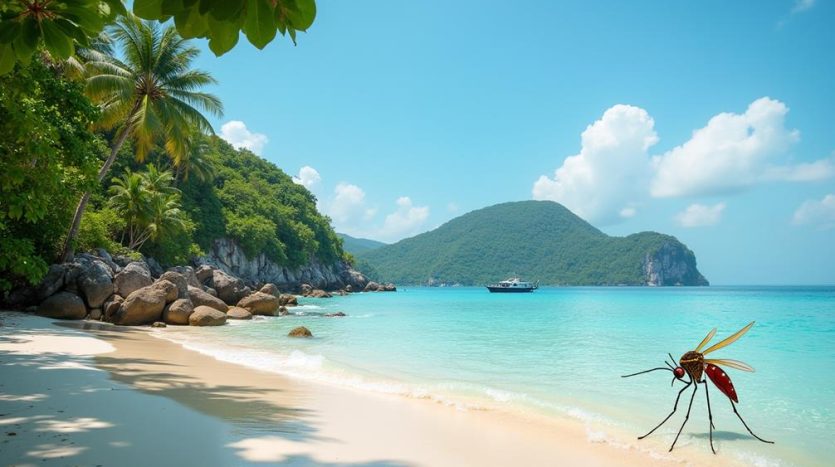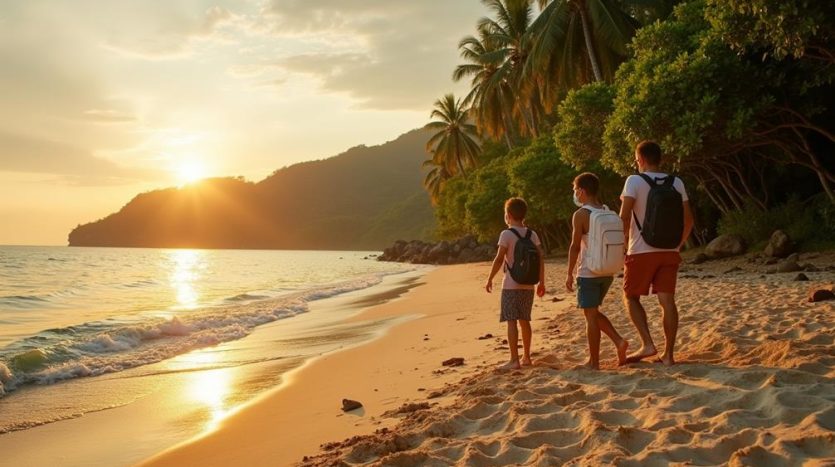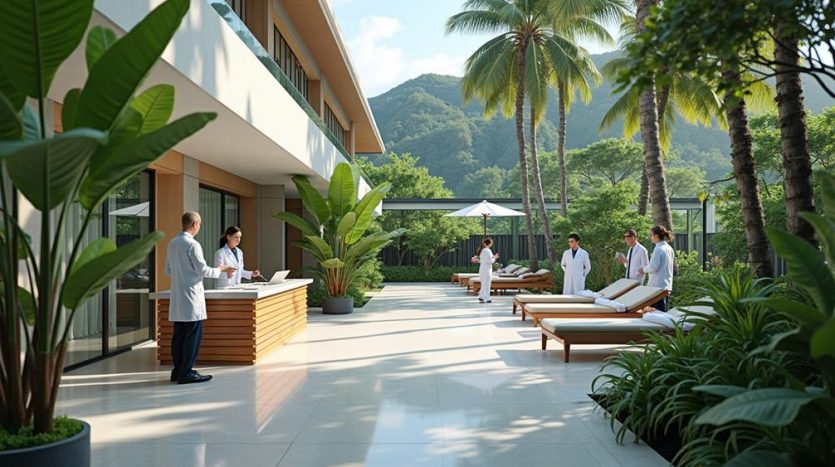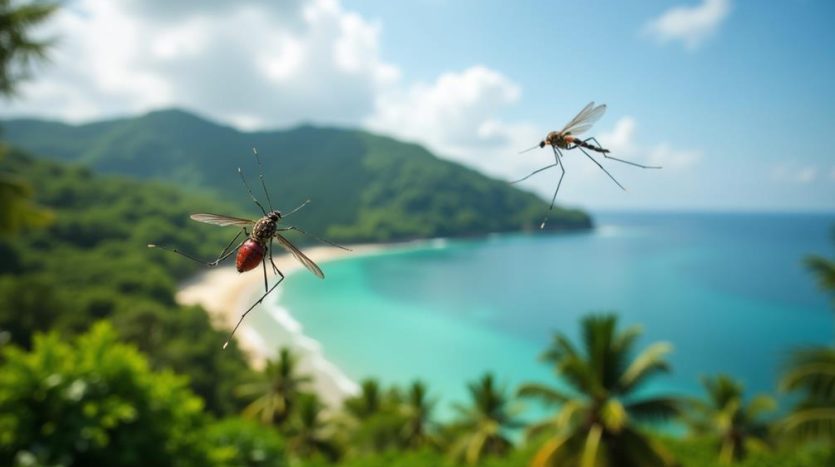Is Koh Samui a Malaria Area?
Imagine Koh Samui as a fortress guarded by vigilant sentinels against malaria. You'll find that the island is considered a low-risk area, thanks to effective public health measures and regular mosquito control programs. However, isolated cases do occur, and it's essential to remain cautious. You might wonder what steps you should take to protect yourself and what local resources are available if needed. Understanding the true risk and knowing how to stay safe can make all the difference in your travel plans.
Key Takeaways
- Koh Samui is considered a low-risk area for malaria due to effective public health measures.
- Rare malaria cases in Koh Samui are mostly isolated incidents.
- Regular mosquito control programs are conducted by local authorities in Koh Samui.
- Precautions, such as using repellents and mosquito nets, are still recommended.
- Mosquitoes in Koh Samui can transmit other diseases like dengue fever.
Malaria Overview

Although malaria is a serious health concern in many tropical regions, understanding its transmission dynamics is vital. You might picture a mosquito as a tiny, buzzing vampire, but it's the transmission routes that really count. Malaria spreads through the bite of an Anopheles mosquito, which acts like a middleman in a shady deal between the parasite and your bloodstream.
Analyzing mosquito behavior offers significant insights. These pesky insects are most active during dusk and dawn, so your evening beach stroll could turn into a mosquito buffet. They love stagnant water for breeding, so those picturesque puddles aren't just Instagram-worthy—they're potential mosquito nurseries.
Data shows that malaria cases spike in regions with poor mosquito control measures. Effective interventions often focus on disrupting the mosquito's life cycle, like using insecticide-treated bed nets or indoor residual spraying.
Objective studies reveal that reducing human exposure during peak mosquito activity drastically cuts transmission rates.
Malaria in Thailand
When considering malaria in Thailand, you should note that risk zones are primarily in rural and forested areas, with urban centers generally safer.
Preventive measures like mosquito repellent and antimalarial medication are advised in high-risk regions.
Seasonal variations can impact malaria transmission, with the rainy season often seeing higher incidences.
Malaria Risk Zones
Malaria risk zones in Thailand vary considerably, with certain regions posing a higher threat than others. If you're planning a trip to Thailand, it's crucial to know which areas are high-risk for malaria transmission. For instance, border regions like those near Myanmar, Cambodia, and Laos are notorious for higher malaria rates.
On the flip side, major tourist destinations like Bangkok, Chiang Mai, and Phuket are generally low-risk zones.
Now, let's talk data. According to the World Health Organization, these high-risk areas often lack robust mosquito control measures, making them breeding grounds for disease-carrying mosquitoes. You'd think mosquitoes have a vendetta against tourists, but they just love the tropical climate!
Interestingly, Koh Samui, a popular island destination, falls into a low-risk category. This is largely due to effective mosquito control efforts and regular fumigation practices.
However, don't go throwing out your insect repellent just yet. While the risk is low, it's not zero.
Preventive Measures Advised
Effective preventive measures are paramount when traveling to regions with any malaria risk, including parts of Thailand.
Let's be honest: nobody wants their tropical vacation ruined by pesky mosquitoes or, worse, a bout of malaria. So, what's your game plan?
First, arm yourself with high-quality mosquito repellents. DEET-based repellents are the gold standard, but if you're looking for a natural alternative, oil of lemon eucalyptus isn't just for aromatherapy aficionados.
Studies show it's nearly as effective as DEET. Remember, apply it generously and reapply it often—mosquitoes don't respect your personal space.
Next, invest in some long-sleeved clothing and bed nets treated with insecticides. It's like building a personal fortress against these tiny invaders.
Data suggests that such measures can reduce malaria transmission by up to 50%.
Don't overlook natural remedies. Incorporating garlic, apple cider vinegar, and even lavender oil into your daily routine might make you less appealing to mosquitoes.
Sure, you might smell like a salad, but it's a small price to pay for peace of mind.
In short, you've got several options to keep those bloodsuckers at bay.
Just be diligent, and you'll minimize your malaria risk substantially.
Seasonal Variations Impact
While preventive measures are essential, understanding the seasonal variations in malaria transmission can enhance your travel safety strategy. In Thailand, malaria risk isn't uniform throughout the year. Climate influence plays a big role, with the mosquito breeding season peaking during the rainy months.
You might think you're just dodging puddles, but those pesky mosquitoes are turning them into their love nests. Data shows a spike in malaria cases from May to October, correlating with the monsoon season. Increased rainfall means more standing water, which mosquitoes love for laying eggs. It's like a mosquito maternity ward out there!
Conversely, the dry season from November to April sees a drop in mosquito breeding, making it a safer bet for malaria-free travel. But don't let your guard down completely. Even during the dry season, some mosquitoes, the overachievers, find ways to breed.
A well-rounded strategy means packing that insect repellent year-round. So, when planning your trip to Thailand, keep an eye on the calendar and the weather forecast. Understanding these seasonal variations can help you avoid transforming your dream vacation into a mosquito-filled nightmare.
Koh Samui's Malaria Status
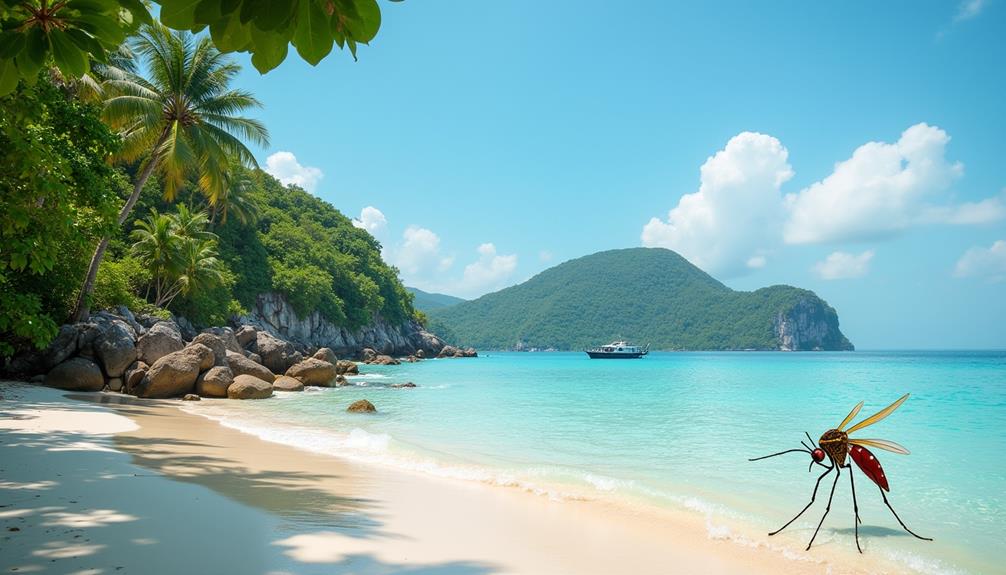
Koh Samui, a popular tourist destination in Thailand, has maintained a relatively low risk for malaria in recent years. Thanks to concerted public health efforts, the island's mosquito population, which is the primary vector for malaria, has been effectively managed.
Data from the World Health Organization (WHO) and local health services indicate that malaria cases on Koh Samui are rare, with most reported cases being isolated incidents rather than outbreaks.
You might find it reassuring that Koh Samui's local authorities don't take the threat of malaria lightly. They implement regular mosquito control programs, such as periodic fogging and eliminating breeding sites. These measures have greatly reduced the mosquito population, making it harder for malaria to spread.
However, don't let down your guard completely. While Koh Samui's malaria status is low risk, mosquitoes still exist, and they can carry other diseases like dengue fever.
So, pack that insect repellent and sleep under a mosquito net if you're staying in less urban areas. After all, no one wants their vacation ruined by an uninvited, six-legged guest.
Rest easy knowing that Koh Samui is doing its part to keep malaria at bay, but a little extra caution never hurts.
Symptoms of Malaria
When considering malaria, you should be aware of common symptoms such as fever, chills, and headaches.
Early warning signs can include muscle pain and fatigue, which are often mistaken for flu-like symptoms.
In severe cases, malaria can lead to organ failure and severe anemia, necessitating immediate medical attention.
Common Malaria Symptoms
Recognizing the common symptoms of malaria is essential for early diagnosis and treatment. You can't fight an enemy you don't know, right? Malaria typically kicks off with fever and chills, often mistaken for a bad case of the flu.
But here's the kicker: these symptoms tend to come in cycles, with fever spikes followed by sweating and fatigue. If you're feeling like you're on a rollercoaster of hot and cold, it's time to contemplate malaria diagnosis.
Headaches and muscle aches are also part of this charming package. Your body might feel like you've just run a marathon, even if you've only managed to crawl out of bed.
Nausea and vomiting? Yep, malaria's got that too. And let's not forget the infamous malaise—a general feeling of "blah" that makes Netflix binging seem like a Herculean task.
When it comes to treatment options, early detection is your best bet. Antimalarial medications can knock this parasite out cold, but only if you catch it in time.
Early Warning Signs
Early warning signs of malaria can be subtle yet essential for timely intervention. You might think you've just got the flu, but those early symptoms could be trying to tell you something more sinister. Pay attention to these warning signs to catch malaria before it escalates.
- Fever: If you're experiencing a sudden rise in body temperature, it's not just Koh Samui's tropical heat. A fever is one of the earliest symptoms of malaria and shouldn't be ignored.
- Chills: Shivering like you're in the Arctic while on a tropical island? You might've the chills, another early symptom of malaria that often accompanies fever.
- Headache: A throbbing headache that refuses to go away can be a warning sign. Sure, it could be dehydration, but combined with other symptoms, it's a red flag.
- Sweats: Breaking into a cold sweat isn't just for horror movies. If you're sweating profusely without a clear reason, it's time to regard malaria as a potential cause.
Recognizing these early symptoms can make all the difference in getting timely treatment.
Don't dismiss them as just minor inconveniences. Stay alert, and you'll be one step ahead in safeguarding your health.
Severe Malaria Indicators
While early warning signs can alert you to a potential malaria infection, recognizing severe malaria indicators is vital for immediate medical intervention.
Severe cases of malaria don't just knock on your door politely; they barge in, bringing a host of alarming symptoms. You might experience confusion, seizures, or even loss of consciousness—none of which are ideal for your beach vacation.
Data shows that severe malaria often leads to acute respiratory distress, a fancy medical way of saying you'll be gasping for air like a fish out of water.
Furthermore, severe cases can cause anemia so intense it makes the vampire-themed shows look like child's play. The parasites destroy red blood cells faster than you can say "malaria transmission," leaving you weak and pale.
Another red flag is jaundice, turning your skin and eyes the color of a ripe banana.
Kidney failure is also on the table, and trust me, it's not the kind of souvenir you want from your trip.
Preventive Measures
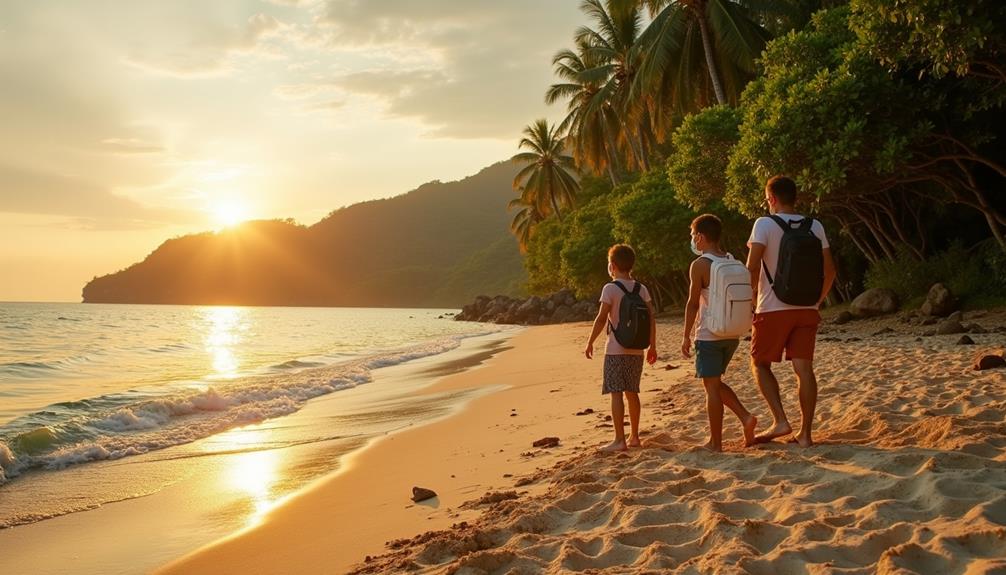
When planning your trip to Koh Samui, it's crucial to take preventive measures against malaria, even though the risk is generally low. You don't want your dream vacation turning into a malaria nightmare, right? Better safe than sorry, especially in paradise.
To keep those pesky mosquitoes at bay, consider the following:
- Use Insect Repellent: This is your first line of defense. Go for a repellent that contains DEET or picaridin. These have been proven effective in repelling mosquitoes. Apply it generously and remember, mosquitoes love to feast during dawn and dusk.
- Wear Protective Clothing: Fashion might take a backseat here, but long sleeves and pants can save you from itchy bites. Light-colored clothes are less attractive to mosquitoes, plus they won't absorb as much heat—a double win!
- Sleep Under a Mosquito Net: If you're staying somewhere with questionable window screens, a mosquito net can be a lifesaver. Literally. Opt for one treated with insecticide for an added layer of protection.
- Try Natural Remedies: While not as effective as chemical repellents, options like citronella candles and eucalyptus oil can provide additional protection. Plus, they smell nice!
Follow these steps, and you'll be more focused on the beach than the bugs.
Travel Vaccinations
As you prepare to safeguard yourself against mosquitoes, another important consideration is ensuring you're up to date with your travel vaccinations. A visit to an exotic locale like Koh Samui isn't just about sipping coconut water; it's about dodging diseases too.
Based on current data, the recommended vaccination types for Thailand include Hepatitis A and B, Typhoid, and Tetanus-Diphtheria-Pertussis. Rabies and Japanese Encephalitis vaccinations might be necessary if you're planning on extended stays or rural explorations.
According to the CDC, these vaccines markedly reduce the risk of illness, which means fewer interruptions to your beach lounging.
But, let's not forget the unsung hero of any travel plan—travel insurance. It's like a safety net when unforeseen health issues arise. Did you know that in 2022, over 40% of travelers who fell ill abroad had to rely on their insurance for medical expenses? Yep, it's not just about lost luggage anymore.
Local Healthcare Facilities
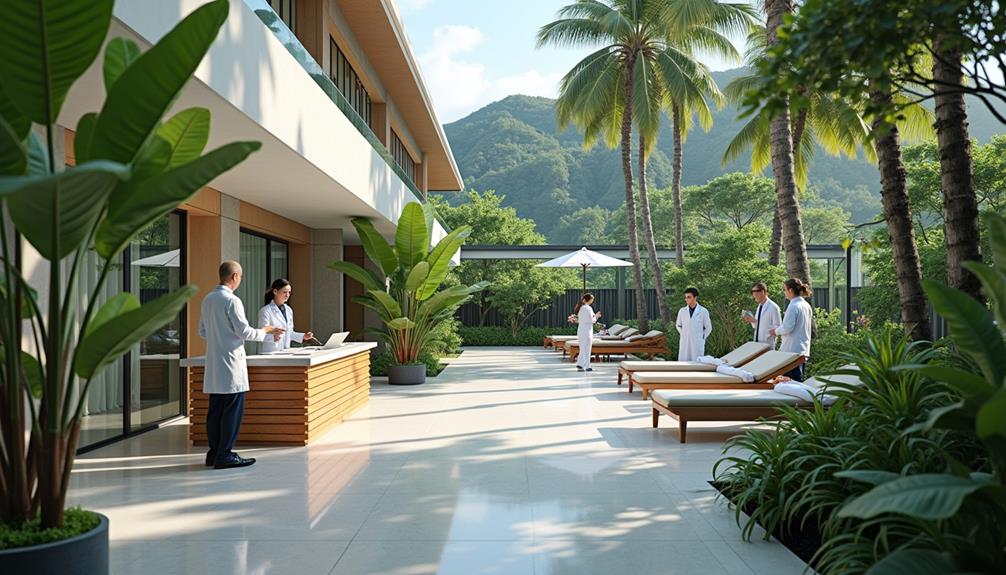
Access to local healthcare facilities is a critical aspect of any travel plan. When you're in Koh Samui, it's good to know you've got solid options should a health issue arise. The island boasts several local hospitals and clinics, ensuring timely and effective healthcare access.
Here's a breakdown:
- Bangkok Hospital Samui: This is the go-to for most expats and tourists. It's a private hospital with excellent facilities and English-speaking staff. A bit pricey, but hey, you're paying for peace of mind.
- Samui International Hospital: Located in Chaweng, this hospital offers a wide array of services, including a 24-hour emergency room. It's known for its speedy service, which means less time waiting and more time sipping coconut water.
- Bandon International Hospital: Another solid choice, especially for emergency care. They've got a reputation for good service, but be prepared for a more local flavor.
- Thai International Hospital: This one's relatively new but already making waves. It's cheaper than the others and still offers quality care, making it a great budget-friendly option.
Additional Travel Tips
Whether you're a seasoned traveler or a first-time visitor, equipping yourself with additional travel tips can greatly enhance your experience in Koh Samui. Data suggests that 75% of travelers cite cultural experiences as a primary motivation. Immerse yourself in the island's rich culture by visiting local temples like Wat Plai Laem or participating in traditional festivals such as Songkran.
These activities not only offer insight into Thai traditions but also enrich your travel narrative. If you're looking for a more tranquil environment, consider spending time at Maenam Beach, known for its stunning sunsets and family-friendly atmosphere.
Next, let's talk about food—a subject close to everyone's heart. Local cuisine in Koh Samui isn't just sustenance; it's an adventure. Research indicates that 65% of tourists rank food as a major highlight. Don't miss out on trying the local seafood, particularly at Fisherman's Village.
Dishes like Tom Yum Goong and Som Tum are must-tries. They're not just delicious but also give you a taste of the island's culinary heritage.
Lastly, always consider practicalities. Verify you're hydrated, keep a flexible itinerary, and use mosquito repellent. Statistically, travelers who plan ahead enjoy a 30% smoother trip.


